A comprehensive worldwide study finds domestic maritime cabotage laws are commonplace among UN member states
Summary:
Maritime cabotage laws govern the transportation of goods and people between two ports in the United States, which generally restricts such transportation to U.S.-flagged, U.S.-crewed, U.S.-built and U.S.-owned vessels. These laws are commonly referred to as the “Jones Act”. A new study, Cabotage Laws of the World, performed by Seafarers’ Rights International (SRI) for the International Transport Workers’ Federation (ITF) found that nearly two-thirds of the maritime states of the United Nations, covering every geographic region of the world, provide some degree of governance support for their respective maritime cabotage trades that favors each nation’s domestic ships. CLICK HERE to learn more.
Downloadable Graphics:
Key Findings:
Cabotage is “Widespread,” Existing in Nearly Two-Thirds of UN Maritime States
91 countries representing 80% of the world’s coastlines of United Nations maritime states have cabotage laws restricting foreign maritime activity in their domestic coastal trades.
Cabotage Exists Across All Political, Economical, and Legal Systems
UN member states with cabotage include China, South Korea, Russia, Japan, Chile, Mexico, Brazil, Argentina, Australia, and Canada.
Cabotage Laws have Endured for Centuries
Cabotage laws are grounded in maritime history and have existed in the laws of some UN member states for centuries. The study found that rudimentary principles of cabotage date back to as early as 1381 in the reign of King Richard II.
There is No Single Definition of Cabotage
There is a rich variety of approaches taken by states regarding virtually every aspect of cabotage. This comprehensive in-country legal review assessed national laws to determine if trade was reserved to national ships or if it restricted foreign flag ships from conducting cabotage.
Cabotage Policy Objectives are Diverse
Stated objectives include: maintain national security; promote fair competition; develop human capacity; create jobs; promote ship ownership; increase safety and security of ships in port; enhance marine environmental protection; and preserve maritime knowledge and technology.
What is Cabotage?
While there is no common definition of cabotage at the international level, this report utilizes the term cabotage as a reference to nations that provide some degree of governance for their respective domestic maritime trades that favors each nation’s domestic ships. National laws often replace the word “cabotage” with terms such as coastal trade, coasting trade, coastwide trade or domestic trade.
Background of Study:
- First major maritime cabotage review of all 193 members states of the United Nations.
- First analysis with input from practicing lawyers from each of the 140 UN member states included in the survey.


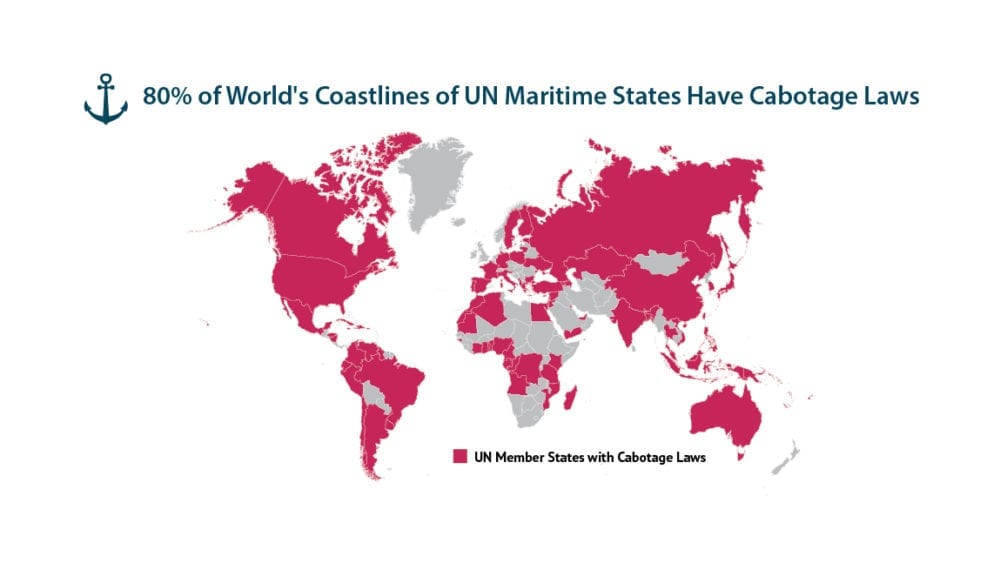
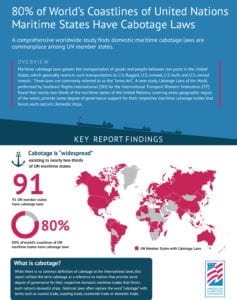
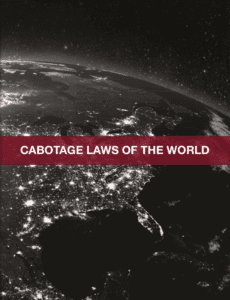
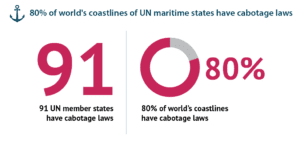
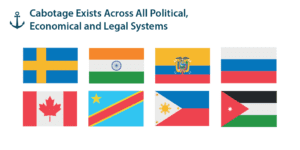
Comments are closed.